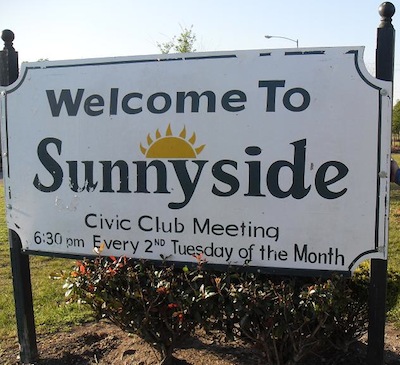Looking at the Sunnyside of Life: Lessons from Southside
D'Lynn Barham
May 07, 2013
"Everyone has a personal story to tell." This is one of the core values of Writers in the Schools. Along with many other UH creative writing graduate students, I work for WITS, a non-profit organization that sends writers into classrooms across the Houston area. We read poetry, fiction, essays, and anything else that we hope will inspire our students to put their stories down on paper. Sometimes we get an entire school year with our students, and other times we may only get the spring semester. But sometimes our students can't write. I don't mean writer's block; I mean that they can't physically form letters on a page. So, we take dictation, or we let them create their story through art. At the end of the school year (or placement), we create classroom anthologies. These simple, staple-bound collections are the much-loved reward: for the students, their teachers, and for us, the writers. Not only do the children write the poetry and prose that goes into the books, they also are involved in revising, editing, and illustrating the anthologies. This year, one of my placements was in Sunnyside, a south Houston neighborhood. And while I knew I was driving my car south each Wednesday, I did not know much about the neighborhood, not even its name. This school has a low attendance rate and a high suspension rate. The turnover in the classroom was higher than anything I've experienced. Each classroom had, at one time or another, thirty students. (I'm happy to report that they are adding a teacher to the cluster next year.) Some of my students couldn't write their names. I taught third grade. Let's recap: a 26-week placement, student attendance is low, some students can't form sentences or even letters, a mandatory anthology of student work is due at the end of the school year. Panic sets in. Then, on the first of May, on the radio during my morning commute I heard about a new study: Sunnyside is ranked the sixth most dangerous neighborhood in the country, the most dangerous in Houston. As I listened carefully, I realized my placement was in that neighborhood. Quick research showed that residents of Sunnyside have a 1-in-11 chance of being the victim of crime each year. And I was worried about anthologies? Don't misunderstand, I still believed that publishing the children's writing was important, maybe more important than I realized. They have amazing stories to tell. But the reality of these children's lives hit me in the gut. Violence. Crime. Gangs. Drugs. Foster homes. Graves. The last month I was in the classrooms with my kids, I focused more on listening to and learning from them. Here are the lessons my Sunnyside third graders taught me. • Live in the moment. "He doesn't know what he wants to be when he grows up, but right now he's enjoying his eight-year-old young man life." [H.J., 8 years old] "Your Mama" jokes never get old. "In 1989, your mama was so fine. She hit the flo', did a jelly roll, back in 1989." [A.J., 8 years old] Be honest, even if it is tough. "That's a crack sign." [D.A., 9 years old, when asked if a symbol his classmates were drawing was a gang sign] Be grateful for what you have. "Love is the taste of bacon on Sunday." [K.M., 8 years old] Follow your path, not someone else's. "When he grows up he wants to be able to do a back flip." [T.A., 9 years old] Be aware of your cultural/social surroundings. Student: "I like your outfit, Mrs. D'Lynn." Teacher: "No, you don't. Would you wear her outfit?" Student: "No, ma'am." Teacher: "Then you tell her she looks nice today." Student: "You look nice today, Mrs. D'Lynn." Me: "Thank you." Remember your past. "Love is my brother's graveyard." [S.A., 9 years old] Love yourself. "The doctor could see everything that she loved. She loved a lot, but there was one thing that he didn't see in her heart. He didn't see her in there. The doctor wondered if she didn't love herself." [T.R., 8 years old] Care for those around you. "Wait, gotta get my girl situated." [A.J., 8 years old] Everyone needs love. "Can I practice giving you a hug?" [A.D., 9 years old]

Comments (0)
Add a Comment